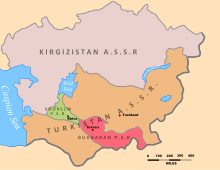Turkestan Autonomous Soviet Socialist Republic
| Turkestan Autonomous Soviet Socialist Republic Туркестанская Автономная Советская Социалистическая Республика | |
|---|---|
| Autonomous republic of the Russian SFSR | |
| 1918–1924 | |
|
Flag | |
 Map of Soviet Central Asia in 1922, indicating the location and extent of the Turkestan ASSR (brown) | |
| Capital | Tashkent |
| Historical era | Interwar period |
• Established | 30 April 1918 |
• Disestablished | 27 October 1924 |
| Today part of | |
The Turkestan Autonomous Soviet Socialist Republic (initially, the Turkestan Socialist Federative Republic; 30 April 1918 – 27 October 1924) was an autonomous republic of the Russian Soviet Federative Socialist Republic located in Soviet Central Asia.
During the Russian Empire, the Turkestan ASSR's territory was governed as Turkestan Krai, the Emirate of Bukhara, and the Khanate of Khiva. From 1905, Pan-Turkist ideologues like Ismail Gasprinski aimed to suppress differences among the peoples who spoke Turkic languages, uniting them into one government.[1] This idea was supported by Vladimir Lenin, and after the Russian Revolution of 1917, the Bolsheviks in Tashkent created the Turkestan ASSR. But in February 1918, the Islamic Council (Template:Lang-uz) and the Council of Intelligentsia (Uzb. Shuroi Ulammo) met in Kokand city and declared a rival Turkestan Autonomous Republic, battling Bolshevik forces until the 1920s.[1]
Meanwhile, a power struggle among the Communists ensued between those favoring a Pan-Turkist government like Turar Ryskulov and Tursun Khojaev, and those in favor of dividing Soviet Turkestan into smaller ethnic or regional units, such as Fayzulla Khodzhayev and Akmal Ikramov. The latter group won, as national delimitation in Central Asia began in 1924.[1] Upon dissolution, the Turkestan ASSR was split into Turkmen SSR (now Turkmenistan), Uzbek SSR (now Uzbekistan) with the Tajik ASSR (now Tajikistan), Kara-Kirghiz Autonomous Oblast (now Kyrgyzstan), and Karakalpak Autonomous Oblast (now Karakalpakstan).[1]
| Date | Name |
|---|---|
| 30 April 1918 | Turkestan Soviet Federative Republic (constitution adopted 15 October 1918) |
| 24 September 1920 | Turkestan Autonomous Soviet Socialist Republic |
| 30 December 1922 | Turkestan A.S.S.R. part of Soviet Union (within Russian S.F.S.R.) |
| 27 October 1924 | Dissolved |
Turksovnarkom
Chairmen of the Council of People's Commissars ("Turksovnarkom")
| Initial date | Final date | Name |
|---|---|---|
| 15 November 1917 | 30 April 1918 | Fyodor Ivanovich Kolesov |
| 30 April 1918 | June 1918 | Pyotr Alekseyevich Kobozev |
| June 1918 | 5 October 1918 | Fyodor Ivanovich Kolesov |
| 23 October 1918 | 19 January 1919 | Vladislav Damyanovich Figelskiy |
| 30 March 1918 | March 1920 | Karp Yeliseyevich Sorokin |
| 19 September 1920 | 1922 | Kaikhaziz Sardarovich Atabayev |
| 1922 | 12 January 1924 | Turor Risqulovich Risqulov |
| 12 January 1924 | 27 October 1924 | Shah Ahmad Islamov |
References
- Uzbekistan at worldstatesmen.org, accessed 23 July 2009.
- Edgar, Adrienne Lynn (2004), Tribal Nation: The Making of Soviet Turkmenistan, Princeton, New Jersey: Princeton University Press
- Use dmy dates from April 2013
- States and territories established in 1918
- States and territories disestablished in 1924
- Autonomous republics of the Soviet Union
- Early Soviet republics
- Soviet Central Asia
- Communism in Kyrgyzstan
- 20th century in Kyrgyzstan
- Communism in Uzbekistan
- History of Uzbekistan
- History of Kazakhstan
- Communism in Turkmenistan
- History of Turkmenistan
- Communism in Tajikistan
- History of Tajikistan
- Geography of Uzbekistan
- Geography of Kazakhstan
- Geography of Kyrgyzstan
- Geography of Turkmenistan
- Geography of Tajikistan

